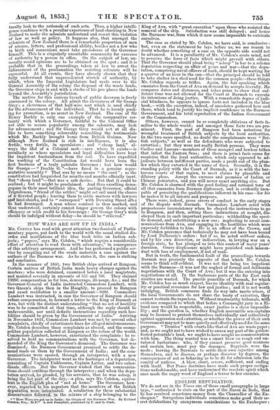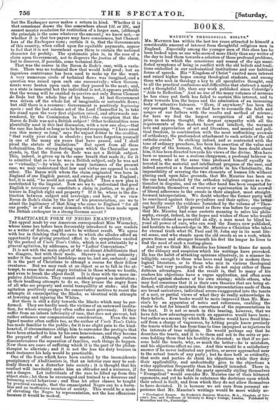ENGLISH REPUDIATION.
WE do not see in the Times one of those small paragraphs in large type' " authorized to state on the part of the Baron de Bode,, that he has received conscience-money from the Chancellor of the Ex- chequer." Scrupulous individuals sometimes make good their se. cret defalcations by anonymous contributions to the Exchequer ;
but the Exchequer never makes a return in kind. Whether it is that conscience draws the line somewhere about 151. or 201., and cannot muster resolution for restitution of a larger sum, (although the principle is the same whatever the amount,) we know not,—or whether it is that tax-payers may have consciences, but Chancel- lors of the Exchequer none; certain it is, that the Governments of this country, when called upon for equitable payments, appear to feel that it is not incumbent upon them to sustain the national character for probity. The systematic plan is, in the case of a claim upon Government, not to disprove the justice of the claim, but to discover, if possible, some technical flaw.
That was the course in the Baron de Bode's case, with a varia- tion. There was no technical flaw that would hold good ; but an ingenious contrivance has been used to make up for the want. A very numerous circle of technical flaws was imagined,'and a question was raised upon each one successively; when Govern- ments were beaten upon each one they passed to the next; and, as a state is immortal but the individual is not, it appears probable that the wrong will be enabled to survive not only Baron Clement ale Bode but the whole line of his house. At last Government was driven off the whole list of imaginable or untenable flaws; but still there is a resource : Government is positively beginning again ; and the last solemn act of the Lord Chancellor is, to take his stand upon the very first objection raised, and afterwards sur- rendered, by the Commission in 1815—the exception that the Baron de Bode was not a British subject I Other technicalities were plentifully used in this last discussion, with a new, one also,—that the case has lasted so long as to be beyond reopening. " I have owed you this money so long," says the unjust debtor to the creditor, " that really your claim is obsolete ; you have forgotten yourself in one of the many six years that have passed, and I shall plead the statute of limitations." But apart from all these technicalities, the strong footing upon which the Chancellor now stands, is, that the Baron de Bode was not a British subject. This, indeed, is given up in the same breath that made it; for it is admitted that in law he was a British subject, only he was not so "virtually,"—by which, as in many instances of the present ease, we may understand that law and virtue are opposed to each other. The Baron with whom the claim originated was born in England of one English parent, and owned property in England ; but, it is said, "he could not speak English." Thus a new plea is contributed by the linguist. Now are we to understand that good English is necessary to constitute a claim in justice, or to give a tenure in English right and property P If it be, where is the dis- tinction between subject and sovereign ; and how, if we view Baron de Bode's claim by the law of his pronunciation, are we to admit the legitimacy of that King who came to England "for all our goods," or of the many demands which have been made upon the British exchequer in a strong German accent ?



























 Previous page
Previous page